- Home
- Joe McKinney
Inheritance Page 2
Inheritance Read online
Page 2
“You miss her?” Martin Henninger said suddenly.
Reluctantly, Paul nodded again.
“Yeah, well, I’ll tell you what. How about the next time you find yourself out here talking to her, you tell her I miss her, too, okay? And maybe, if we both miss her hard enough, she’ll climb up out of the ground and make us a fucking pot roast. I’d like that. Maybe she could clean the house while she’s at it.”
“Daddy, I—”
“Don’t say anything, Paul. If you do, you’ll just piss me off.”
His father looked away from him then, his eyes sweeping the yard, taking in the goats, the tidal motion of the yellow cheatgrass blowing in the breeze, the whole sweep of a land that was as lonely as it was vast. Paul could feel his father’s hold on his mind slackening, and he sagged inward, as though he were a marionette whose strings had just been cut.
“Go feed the goats,” he said.
Paul did as he was told. He went back into the barn and filled two large plastic buckets with feed, and when he came back out, his father was gone.
Paul went to work, pouring out little piles of green feed pellets along the road, the herd following along a few feet behind him. Between the full grown goats and the new crop of kids born earlier that summer, they had ninety-six animals. But the king of the herd was a huge two hundred and fifty pound billy that Paul called Oscar. Oscar always had to have the first pile of food. None of the others were dumb enough to challenge him for it. If they tried, he’d piss on their heads, the typical way one goat asserts dominance over another. He’d probably piss on the food they were trying to eat, too. Then, likely as not, he’d ram them into the ground. He’d killed a young billy that way last February.
After that, Paul had developed a system for feeding time. The first pile was Oscar’s. He’d drop a mound of the green feed pellets up near the barn, then he’d head down the road a ways and drop most of the rest of the feed farther off. By the time he made it back to Oscar’s pile, the big billy was usually about done. He’d drop the last handful or so on Oscar’s pile and that was usually enough to keep him away while the others finished eating.
He went through his chores in a drowsy haze, still thinking of his mother. When he was done he walked back to the barn and hung the feed buckets up on the wall. He looked around. A part of him was hoping his mother would be there, waiting for him. But when he peered into the darkness of the barn’s hold, it was empty.
Confused, and still a little light-headed from his encounter with his father, Paul walked back to the house. His father was standing in the doorway, holding the screen door open, watching him, waiting for him.
***
They ate at a small wooden table in the kitchen, heavy cloth drapes over the windows. The living room beyond the kitchen was dark, the floor strewn with machine parts and tools and spools of baling wire. The latest stick sculpture his father had made was smashed to bits in the corner. Sometimes he did that, smashed them right after he made them.
Martin Henninger ate methodically, turning each piece of chicken over and over in his hands, working every last strip of meat off the bone before discarding it and going on to the next. It was the same way he did everything, one thing at a time, painstakingly deliberate in every detail, however long it took.
Paul fished through the box, looking for a thigh. His father only ate the breasts and the drumsticks and Paul knew to avoid those.
“How’re those new kids doing?” his father asked.
Paul looked up. They hardly ever spoke at the dinner table.
“They’re fine, sir. They’re getting plenty to eat from what I can tell.”
His father grunted.
“That big son of a bitch isn’t muscling them out, is he?”
“No sir,” Paul said. That big son of a bitch was Oscar, but “that big son of a bitch” was as close as he’d ever get to a name from Paul’s father, who thought that people who gave names to animals were idiots.
Martin Henninger grunted again and chased a spoonful of mashed potatoes around his Dixie plate with a plastic Spork. Paul watched him furtively, trying to decide if this was the right time to bring up his decision about UTSA.
“You’re thinking about college,” his father said, and Paul felt like he shouldn’t have been surprised, even though he was, to find his thoughts so neatly laid out on the table, waiting to be stripped clean, like the chicken. “You made a decision, haven’t you?”
“That’s right,” Paul said. He was alarmed. He hadn’t even been aware of his father reaching into his head. Ordinarily, he knew it was happening, and sometimes he could withhold at least some of his thoughts. But this time his father had reached into his head without Paul even knowing.
“You have bad news. You’re afraid I’m going to be angry.”
“It’s not bad news,” Paul said, a little too hurriedly. “It’s good news. I got an offer to play for UTSA.”
Martin Henninger grunted, then took another bite of mashed potatoes. “You got a lot of offers, from what I hear.”
“Yes sir. That’s true.”
“UTSA is a brand new program. It’d be a waste of your time. You want to go to Nebraska. The Big Ten can get you the kind of exposure you need.”
“Well, yeah, Nebraska’s a great program, but...”
“But what? What are you trying to say?”
“I decided to take the offer. I’m going to UTSA.”
Martin Henninger dabbed at the corner of his mouth with a paper napkin, pushed his chair back, and stared at him. “Come again?”
“Yes, sir. I’m gonna stay here. It’s a full ride. Everything’s paid for, same as Nebraska.”
“It’s not the same as Nebraska, Paul.”
“Yeah, I know, but Daddy, I want to stay here. In San Antonio. I want to stay with you.”
“Why in the hell would you want to do that?”
“The farm, Daddy. Our farm. I want to work this land. I feel connected to it. I’ve been feeling like that’s what I’m supposed to do, you know? Have you ever had that feeling? I’ve been thinking about this a lot lately. You know, really trying to get at what it is I’m supposed to be doing, and I think this is it. I want to be here with you. I want to be on this land.”
Paul stopped there and waited for his father to say something, anything. But it didn’t happen. Martin Henninger simply leaned over his plate again and started eating.
But between bites Paul heard him mutter, “Idiot.”
***
That night, up in his room, Paul’s eyes fluttered open in the dark, and the next moment he was wide awake. It wasn’t an unpleasant feeling, rising so suddenly from a deep, dreamless sleep. But still, something felt wrong.
He lay on his side in his metal-framed twin bed, his back against the wall, watching his desk and chair and a few posters on the wall slowly take shape as his eyes adjusted to the dark. The moon was a faint sliver just behind the roof of the barn, and its light gave the window glass a bluish glow. He took a slow breath and stared at the window—not through it, but at it, listening.
The house creaked in the wind like an old boat. It made noise all the time, but he usually only noticed it at times like this, when everything was quiet and he was deep in thought.
Paul got out of bed and walked to the window. The yard below was lost in shadows, the grass moving with the wind, the goats sleeping in clusters around the yard.
He watched the corner of the barn where he had seen his mother standing. She wasn’t there now, but of course he hadn’t expected her to be. Seeing her there, standing there, hugging herself like she was miserably cold, he’d felt like he had electricity moving through his skin. He wasn’t feeling that now. Now, all he felt was a deep, abiding emptiness.
He heard footsteps on the stairs, the old wood there creaking. Turning his head sharply towards his closed bedroom door, he listened to the steps coming closer to his door.
Daddy?
He moved quickly. Paul slipped on a pair of jeans an
d his tennis shoes, and when his father opened the bedroom door, Paul was standing there in the middle of the room, in the dark, fully dressed and waiting for him.
Martin Henninger’s eyes were overbright, lit with an almost fevered intensity. And there were three strange-looking markings on his forehead. They looked like they’d been written with a fingertip dipped in wet ash.
Paul pointed at the markings. “Daddy, what’s—”
“Come down to the barn with me,” he said. He seemed short of breath, excited. “You wanted to stay. It’s time you learned what there is to learn.”
He turned and walked down the stairs.
Paul followed him out the back door and across the lawn. Wind moved through the Spanish oaks above them and moonlight colored the dirt road leading down to the horse pasture a bluish-silver. Paul was trembling, but not from the cool night air. He wanted to ask what was happening, but knew it wouldn’t do any good. His father wouldn’t answer.
But the next instant, they rounded the corner of the barn and Paul found himself looking in on the cavernous space inside, and he couldn’t help himself.
“Daddy, what is...?”
“This is what it means to stay with me.”
They were standing side by side now, looking into the barn.
Paul glanced at his father, and then at the barn. A faint tinge of wood smoke filled the air. Oscar was tied to one of the barn’s support beams. One of the smaller males was standing beside him. The goats looked at Paul with black, glassy eyes. They made no noise, but Paul could see they were scared.
Arranged around the goats, in a half circle, were five of the strange, lattice-like stick sculptures his father had made. Each was different, each of them complex in their own strange architecture. Paul’s gaze moved from one to the next, too confused to ask questions.
It took him a moment longer to realize the walls were covered with writing. With his mouth agape he scanned the words, if that was even what they were. They weren’t in any language he could understand.
“Daddy, what is all this?”
“You wanted to stay, Paul. I tried to keep you away. I tried to get you to go as far away from here as possible. But you wouldn’t go. So this is what there is. This is the world I have to give you.”
Paul looked at his father. If what the man had said was meant as an apology, there was no trace of it in his expression. The same fevered intensity lit his eyes, and his skin was glistening with sweat. He looked crazed, and without thinking, Paul took a step back.
“I never got to prepare you, Paul. I’m sorry. When I went through this, I was more prepared than you are now. But the time is now. This won’t wait.”
“What...?”
“This is gonna terrify you. I know that. But you don’t need to be afraid. It won’t hurt. I promise. It’ll make you stronger.”
“I don’t understand.”
“Paul, I’m about to show you how to do things you’ve never imagined before. I can teach you how to control your world. I mean really control it, bend it to your will.”
Paul took another step back. The alarms in his head were screaming.
“Stop!” his father commanded.
And suddenly, he couldn’t move. His body felt numb, his legs weak. Something was in the barn with them. Something dark, focused, getting stronger. Paul felt it swirling all around him, moving up his spine like a cold shiver. He wasn’t sure how he knew it, but Paul was certain the presence was feeding off the lattice-like stick sculptures his father had arranged around the barn. Somehow, they were focusing whatever this was, helping it to take shape.
The presence wrapped itself around Paul’s chest. It was hard to breathe. The air smelled rich, intensely fragrant, like cedar. Paul felt nauseous, light-headed, and only at that moment did he realize the presence was trying to enter his head, trying to find a way inside his mind, though its grip was delicate, subtle, not at all like his father’s brutal assaults.
Paul gasped in fear, his eyes wide open and staring all about the barn for some way to escape.
“Don’t be frightened,” his father said. “You can feel it, can’t you? That’s power, Paul. Raw, primal power. I’m going to show you how to use it, how to channel it to do whatever you want.”
Martin Henninger closed his eyes, his lips parting.
“Daddy, let me go. Please.”
His father snapped his eyes open again.
“I tried this once before, Paul, but that was a mistake. You were only twelve. I made you forget because it was too much for you. You were too young to have so much power.” He pointed toward the stick lattices. “I was supposed to. The lenses told me to. But I couldn’t. I resisted. I told myself right then I’d drive you away before I gave you so much power, but now I see I was a fool. You’re meant for great things, Paul.” He spread his arms wide to include the stick lattices and the smoking bowl and the goats and the writing on the walls. “You were meant for this.”
He grabbed Paul by the shirt and pulled him deeper into the barn.
“Stand there. Don’t move.”
He let go of Paul’s shirt, but Paul was too stunned to notice. His father put a hand on each of the goats’ head.
The animals flinched, at first, and then calmed as though they’d been drugged. The smaller of the two sank to its knees and turned its head to expose its neck, its mouth open in a silent bleat.
The presence was stronger than ever now. The air had filled with an almost audible vibration. Paul could feel it sliding over his skin, and wanted to scream, to cry out, but couldn’t. He could barely breathe.
Martin Henninger reached behind his back and brought out a large hunting knife.
Paul’s eyes went wide, and still he couldn’t move.
His father grabbed the smaller billy by the throat and lifted him into the air one-handed. Then, without hesitation, he gutted the animal, creating a long, jagged gash from the top of the ribcage down to the rectum.
The goat’s guts spilled out on the floor, and Paul felt vomit rise in his throat.
He forced it back down.
After making the cut, Martin Henninger put the carcass on the ground at Paul’s feet. Then he reached inside and removed the heart. He carried it, blood dripping between his fingers, to a wide, shallow brass bowl in the middle of the barn. Wood shavings were still smoking inside it. He put the bleeding heart into the bowl, and Paul heard the hiss of liquid meeting heat.
He turned to Paul and pointed at the post where Oscar still stood.
“Stand there, next to that big son of a bitch.”
Whatever it was that held him loosened its grip. Paul could feel the blood running through his legs and arms again. He sensed his father’s mind pushing him toward the barn’s center support column.
“No,” Paul said.
His father squinted at him. “Stand there.”
“No way,” Paul said, shaking his head. He tried to run for the door, but his father was faster. He grabbed Paul by the back of his neck and spun him around.
“Get the hell off!” Paul said, and threw a punch at the same time. It landed solidly at the corner of his father’s jaw. But his father didn’t go down. Martin Henninger turned his head to one side and spit blood onto the floor, then squared his shoulders at Paul. Paul barely had time to think before his father balled his left hand into a fist and shot a jab into his face.
He felt like he’d been hit in the mouth with a cinder block. He staggered backwards, arms pin-wheeling for balance. His front tooth was loose. Martin Henninger grabbed him by the front of his shirt and threw him against the support post.
The whole barn shook with the impact, and Paul, unable to keep his feet, slid down onto his butt, eyes blinking stupidly up at his father.
Martin Henninger took off his belt.
Paul, his vision swimming, felt the belt tightening around his neck, and his head snapped back against the post. He groped at the leather, but couldn’t get his fingers under it.
His father tw
ined the belt around his fist like a rodeo cowboy getting ready his ride, then reached into the shadows and came back with the wide, brass bowl. He dipped his thumb into the bowl of blood and ashes, tossed the bowl aside, and ran his thumb across Paul’s forehead, leaving three shapes there.
“This is the name of truth,” he said. “emet, emet, emet. It is my gift to you, Paul, and it marks you.” Martin Henninger touched the marks on his own forehead with his fingertips, then touched the marks on Paul’s forehead. “Wherever you go, this mark will be with you. As will I.”
“No,” Paul said, trying to shake his head. The word came out as a strangled pant. His vision was fuzzy at the edges, his fight to breathe a losing battle. He began to kick, trying to get a foot or a knee or anything between himself and his father.
“Be still, boy.”
Paul tightened the muscles in his neck and strained against the leather with every bit of strength he had. He arched his whole body up, looking like an epileptic in the midst of a seizure. His father moved to one side to better keep his hold on the belt, and suddenly Paul had enough room to kick. He brought his knee up sharply and caught Martin Henninger in the ribcage hard enough to knock the wind out of him.
His father’s grip on the belt loosened for just a moment, and Paul kicked him square in the chest, sending him tumbling backwards. Martin Henninger landed on his ass in front of their tractor’s aerating attachment, his eyes suddenly going wide with pain. A strangled sound escaped him as he looked down and saw the aerator’s tines poking through his chest.
The two of them sat there, looking at each other, the one dying, the other numbed by what he had just done.
“You aren’t gonna stop this from happening,” Martin Henninger said, wheezing, blood-veined bubbles forming on his lips. “I’ve marked you.”
“No.”
Martin Henninger coughed. Blood was filling his lungs. “You don’t choose this, Paul,” he said. “It chooses you.”
“I don’t want it,” Paul said.

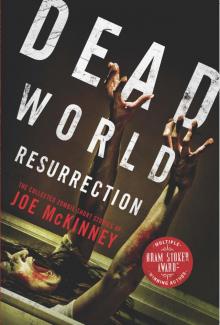 Dead World Resurrection
Dead World Resurrection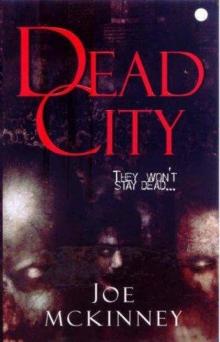 Dead City - 01
Dead City - 01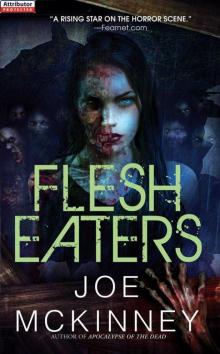 Flesh Eaters
Flesh Eaters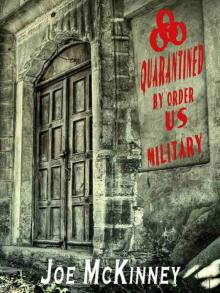 Quarantined
Quarantined Ultimate Undead Collection: The Zombie Apocalypse Best Sellers Boxed Set (10 Books)
Ultimate Undead Collection: The Zombie Apocalypse Best Sellers Boxed Set (10 Books) Inheritance
Inheritance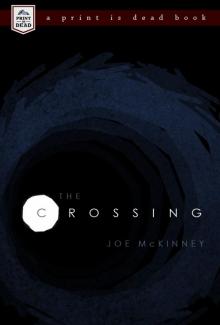 The Crossing: A Zombie Novella
The Crossing: A Zombie Novella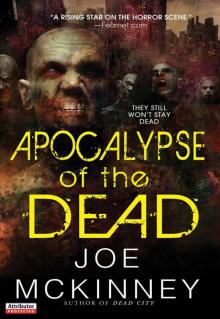 Apocalypse of the Dead
Apocalypse of the Dead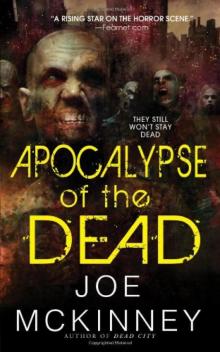 Apocalypse of the Dead - 02
Apocalypse of the Dead - 02 Flesh Eaters - 03
Flesh Eaters - 03 Mutated
Mutated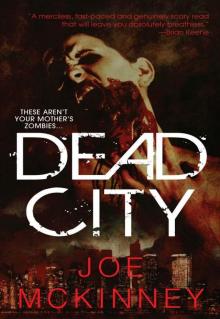 Dead City
Dead City Plague of the Undead
Plague of the Undead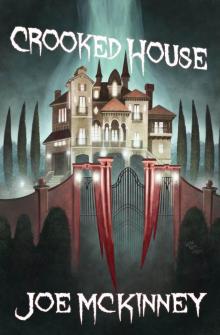 Crooked House
Crooked House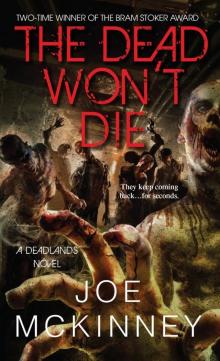 The Dead Won't Die
The Dead Won't Die